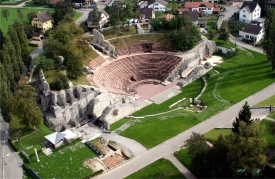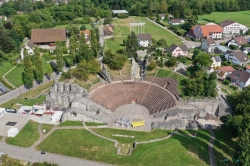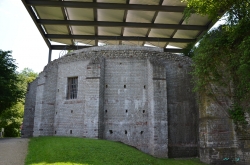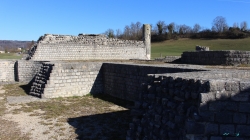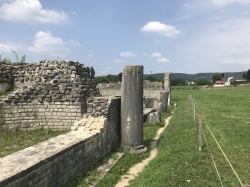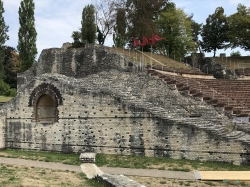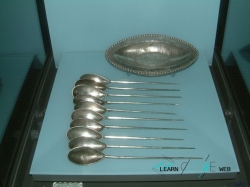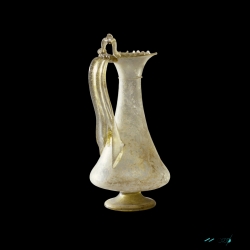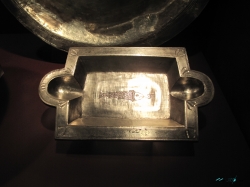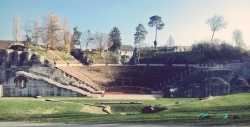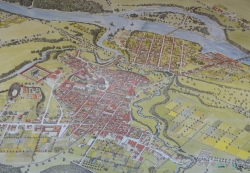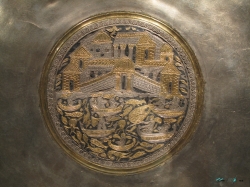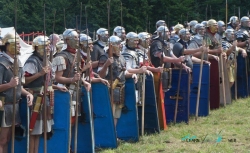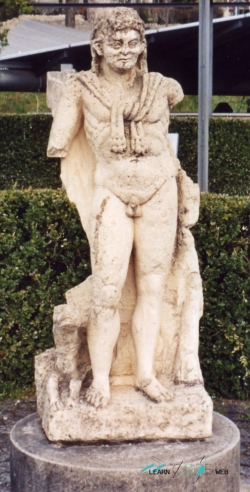Augusta Raurica is a Swiss archaeological site, as well as the oldest Roman town in the Upper Rhine Valley. It is located 10 km east of Basel.
An open-air archaeological museum is dedicated to him. This site houses the most important discoveries of the Roman city and tells its story. Other exhibition halls and more than twenty open-air curiosities can also be visited on the site itself, including the largest Roman theater north of the Alps. The museum’s most important exhibit is the Kaiseraugst Silver Treasure.
The Augusta Raurica site extends over the territory of the municipalities of Augusta, Kaiseraugst and Pratteln, to the south-east of the Basel metropolitan area, on the south bank of the Rhine. It is located on the edge of a north-south communication axis connecting Rome to Germany via the Great St. Bernard Pass, Aventicum (Avenches) to Solodurum (Solothurn) and Windisch, and their junction to Augusta Raurica through the Taubenloch gorges, and passing through the Pierre Pertuis pass. In addition, the Rhine has also favored trade all along the valley.
Augusta Raurica is the first Roman city to emerge after the first Roman invasion of Germany by Julius Caesar, at the request of the inhabitants of the region. At that time, present-day Alsace was occupied in its northern part by the Médiomatriques (People of Gaul of Belgium) and in its southern part by the Sequanes who also populated the Jura, the Saône plain and the Doubs valley. .
Around 60 BC. J. - C., Arioviste, originating in the valley of the Main and the Neckar, comes to occupy with his troops all the region. At the request of the native populations, Julius Caesar at the head of six legions, thirty thousand infantry, eight thousand cavalry, met the Ariovist army in 58 BC. AD, between Cernay and Wittelsheim and inflicts a crushing defeat on him, finally rejecting him with his soldiers on the right bank of the Rhine.
Subsequently, Caesar promotes the installation of new colonists allied with Rome, the Triboques around Brumath and the Rauraques in the south of Alsace up to Augst, hence the name of Augusta Raurica (the Rauraques were tribes Germanic origin from the Ruhr) which will be founded in 43 BC. AD by Lucius Munatius Plancus.
Drusus then established all along the Rhine military camps interconnected by north-south roads, on both banks of the Rhine, of which Argentoratum and Augusta Raurica are among the most important. This Roman conquest of the Rhine area was also accompanied by an administrative organization, the consequences of which can still be seen today in Alsace. In 297, Emperor Diocletian divided the region into two parts which correspond almost to Bas-Rhin and Haut-Rhin.
An open-air archaeological museum is dedicated to him. This site houses the most important discoveries of the Roman city and tells its story. Other exhibition halls and more than twenty open-air curiosities can also be visited on the site itself, including the largest Roman theater north of the Alps. The museum’s most important exhibit is the Kaiseraugst Silver Treasure.
The Augusta Raurica site extends over the territory of the municipalities of Augusta, Kaiseraugst and Pratteln, to the south-east of the Basel metropolitan area, on the south bank of the Rhine. It is located on the edge of a north-south communication axis connecting Rome to Germany via the Great St. Bernard Pass, Aventicum (Avenches) to Solodurum (Solothurn) and Windisch, and their junction to Augusta Raurica through the Taubenloch gorges, and passing through the Pierre Pertuis pass. In addition, the Rhine has also favored trade all along the valley.
Augusta Raurica is the first Roman city to emerge after the first Roman invasion of Germany by Julius Caesar, at the request of the inhabitants of the region. At that time, present-day Alsace was occupied in its northern part by the Médiomatriques (People of Gaul of Belgium) and in its southern part by the Sequanes who also populated the Jura, the Saône plain and the Doubs valley. .
Around 60 BC. J. - C., Arioviste, originating in the valley of the Main and the Neckar, comes to occupy with his troops all the region. At the request of the native populations, Julius Caesar at the head of six legions, thirty thousand infantry, eight thousand cavalry, met the Ariovist army in 58 BC. AD, between Cernay and Wittelsheim and inflicts a crushing defeat on him, finally rejecting him with his soldiers on the right bank of the Rhine.
Subsequently, Caesar promotes the installation of new colonists allied with Rome, the Triboques around Brumath and the Rauraques in the south of Alsace up to Augst, hence the name of Augusta Raurica (the Rauraques were tribes Germanic origin from the Ruhr) which will be founded in 43 BC. AD by Lucius Munatius Plancus.
Drusus then established all along the Rhine military camps interconnected by north-south roads, on both banks of the Rhine, of which Argentoratum and Augusta Raurica are among the most important. This Roman conquest of the Rhine area was also accompanied by an administrative organization, the consequences of which can still be seen today in Alsace. In 297, Emperor Diocletian divided the region into two parts which correspond almost to Bas-Rhin and Haut-Rhin.



